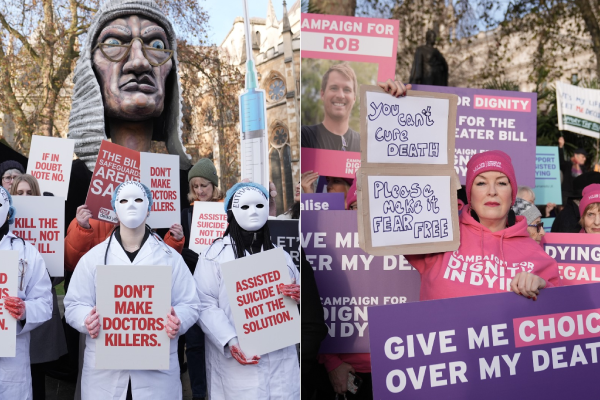A historic bill that would for the first time assist terminally ill persons in ending their lives is currently being debated by British MPs .
Months of discussion and potential revisions to the measure as it passes through the House of Commons and the House of Lords, the upper house of Parliament, begin with the first legislative vote in favor of the bill (330 in favor and 275 against).
If ultimately approved, it would be one of the biggest social reforms in a decade and would put the United Kingdom in line with other nations including Canada, Australia, and certain U.S. states.
The bill would allow mentally competent adults in England and Wales with fewer than six months to live to request and receive help to end their lives.
Assisted suicide is currently illegal in Britain and carries a prison sentence of up to 14 years. That same sentence will remain for anyone found guilty of tricking, pressuring or coercing someone into making the choice if the bill is ultimately passed.
Debate around the contentious bill, which will continue to be discussed in Parliament in the run up to the vote, has prompted an uncommon outpouring of politicians’ emotions and moral persuasions in a political system where voting usually happens along party lines.
Read Also
It has drawn comment from former prime ministers, religious leaders, judges and doctors, and shone a light on one of the few issues — birth and taxes perhaps being the only other two — that happen to everyone. The outcome of the vote looks to be uncertain given how many members of parliament have expressed their ambivalence on the issue.
Those in favor of the bill say such a law would relieve the unnecessary suffering of those with terminal illness and provide dignity and agency in a situation where the two are in short supply.
Opponents say it could put the country on a slippery slope and place vulnerable people, such as the elderly or handicapped, at risk or put them under pressure to end their lives in order to not burden their loved ones.
Kim Leadbeater, an MP for the ruling Labour Party, proposed the bill, arguing it has “three layers of scrutiny.” Two independent doctors and a judge will be needed to sign off on any decision before the state allows a patient end their life.
A 2023 government report showing figures from 2022 showed a 30% jump in the number of people choosing to end their lives, with more than a third of the 13,000 exercising their right saying their decision was partly due to feeling like a burden on loved ones. Canada currently plans to extend the law in 2027 to those whose sole underlying condition is related to mental health.
Terminally ill broadcasting veteran Esther Rantzen, 84, has stage four cancer and has long supported a change in the law. “If I want assisted death, which I do because I want to have the choice, I will have to go to Switzerland… to achieve that,” she said.
“I’m fortunate because I can afford to go,” she added, “but for all the hundreds of thousands of people in the future who can’t afford that and who want to die in their own homes surrounded by the people they love… they will have the choice if this law is changed and that would be a very good change.”
Former Labour Prime Minister Gordon Brown and three of his Conservative successors — Theresa May, Boris Johnson and Liz Truss — have all publicly come out against the bill. But former-Conservative Prime Minister David Cameron this week said that he had reversed his opposition to the U.K. bill.
Cameron also refuted arguments — such as the one posed by the current health secretary Wes Streeting — that the expense and additional administration could add to pressure on the country’s beleaguered National Health Service.
The former prime minister wrote that the bill would apply to a very small number of cases and that “the NHS exists to serve patients and the public, not the other way around.”




